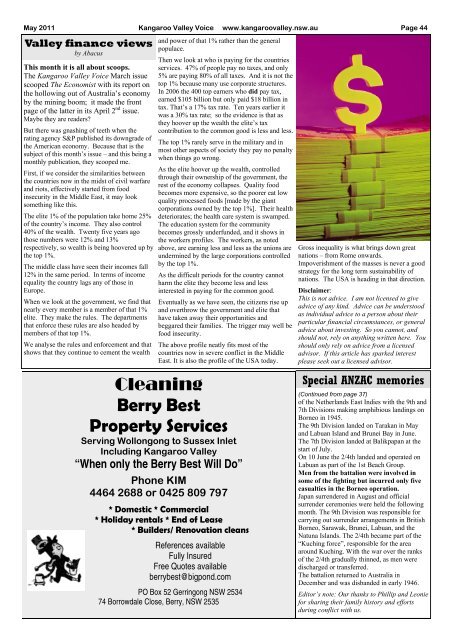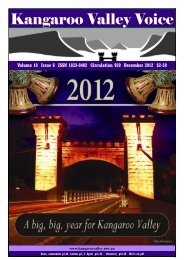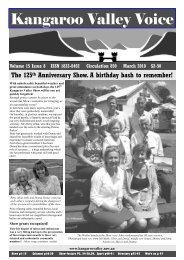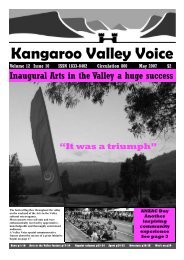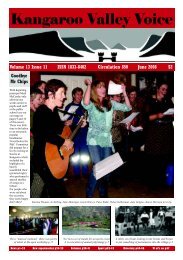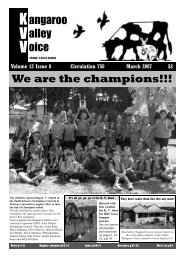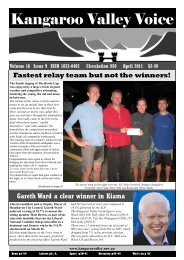Copy of May 2011 - Lazyfish Technology
Copy of May 2011 - Lazyfish Technology
Copy of May 2011 - Lazyfish Technology
You also want an ePaper? Increase the reach of your titles
YUMPU automatically turns print PDFs into web optimized ePapers that Google loves.
<strong>May</strong> <strong>2011</strong> Kangaroo Valley Voice www.kangaroovalley.nsw.au Page 44<br />
Valley finance views<br />
by Abacus<br />
This month it is all about scoops.<br />
The Kangaroo Valley Voice March issue<br />
scooped The Economist with its report on<br />
the hollowing out <strong>of</strong> Australia’s economy<br />
by the mining boom; it made the front<br />
page <strong>of</strong> the latter in its April 2 nd issue.<br />
<strong>May</strong>be they are readers<br />
But there was gnashing <strong>of</strong> teeth when the<br />
rating agency S&P published its downgrade <strong>of</strong><br />
the American economy. Because that is the<br />
subject <strong>of</strong> this month’s issue – and this being a<br />
monthly publication, they scooped me.<br />
First, if we consider the similarities between<br />
the countries now in the midst <strong>of</strong> civil warfare<br />
and riots, effectively started from food<br />
insecurity in the Middle East, it may look<br />
something like this.<br />
The elite 1% <strong>of</strong> the population take home 25%<br />
<strong>of</strong> the country’s income. They also control<br />
40% <strong>of</strong> the wealth. Twenty five years ago<br />
those numbers were 12% and 13%<br />
respectively, so wealth is being hoovered up by<br />
the top 1%.<br />
The middle class have seen their incomes fall<br />
12% in the same period. In terms <strong>of</strong> income<br />
equality the country lags any <strong>of</strong> those in<br />
Europe.<br />
When we look at the government, we find that<br />
nearly every member is a member <strong>of</strong> that 1%<br />
elite. They make the rules. The departments<br />
that enforce these rules are also headed by<br />
members <strong>of</strong> that top 1%.<br />
We analyse the rules and enforcement and that<br />
shows that they continue to cement the wealth<br />
and power <strong>of</strong> that 1% rather than the general<br />
populace.<br />
Then we look at who is paying for the countries<br />
services. 47% <strong>of</strong> people pay no taxes, and only<br />
5% are paying 80% <strong>of</strong> all taxes. And it is not the<br />
top 1% because many use corporate structures.<br />
In 2006 the 400 top earners who did pay tax,<br />
earned $105 billion but only paid $18 billion in<br />
tax. That’s a 17% tax rate. Ten years earlier it<br />
was a 30% tax rate; so the evidence is that as<br />
they hoover up the wealth the elite’s tax<br />
contribution to the common good is less and less.<br />
The top 1% rarely serve in the military and in<br />
most other aspects <strong>of</strong> society they pay no penalty<br />
when things go wrong.<br />
As the elite hoover up the wealth, controlled<br />
through their ownership <strong>of</strong> the government, the<br />
rest <strong>of</strong> the economy collapses. Quality food<br />
becomes more expensive, so the poorer eat low<br />
quality processed foods [made by the giant<br />
corporations owned by the top 1%]. Their health<br />
deteriorates; the health care system is swamped.<br />
The education system for the community<br />
becomes grossly underfunded, and it shows in<br />
the workers pr<strong>of</strong>iles. The workers, as noted<br />
above, are earning less and less as the unions are<br />
undermined by the large corporations controlled<br />
by the top 1%.<br />
As the difficult periods for the country cannot<br />
harm the elite they become less and less<br />
interested in paying for the common good.<br />
Eventually as we have seen, the citizens rise up<br />
and overthrow the government and elite that<br />
have taken away their opportunities and<br />
beggared their families. The trigger may well be<br />
food insecurity.<br />
The above pr<strong>of</strong>ile neatly fits most <strong>of</strong> the<br />
countries now in severe conflict in the Middle<br />
East. It is also the pr<strong>of</strong>ile <strong>of</strong> the USA today.<br />
Cleaning<br />
Berry Best<br />
Property Services<br />
Serving Wollongong to Sussex Inlet<br />
Including Kangaroo Valley<br />
“When only the Berry Best Will Do”<br />
Phone KIM<br />
4464 2688 or 0425 809 797<br />
* Domestic * Commercial<br />
* Holiday rentals * End <strong>of</strong> Lease<br />
* Builders/ Renovation cleans<br />
References available<br />
Fully Insured<br />
Free Quotes available<br />
berrybest@bigpond.com<br />
PO Box 52 Gerringong NSW 2534<br />
74 Borrowdale Close, Berry, NSW 2535<br />
Gross inequality is what brings down great<br />
nations – from Rome onwards.<br />
Impoverishment <strong>of</strong> the masses is never a good<br />
strategy for the long term sustainability <strong>of</strong><br />
nations. The USA is heading in that direction.<br />
Disclaimer:<br />
This is not advice. I am not licensed to give<br />
advice <strong>of</strong> any kind. Advice can be understood<br />
as individual advice to a person about their<br />
particular financial circumstances, or general<br />
advice about investing. So you cannot, and<br />
should not, rely on anything written here. You<br />
should only rely on advice from a licensed<br />
advisor. If this article has sparked interest<br />
please seek out a licensed advisor.<br />
Special ANZAC memories<br />
(Continued from page 37)<br />
<strong>of</strong> the Netherlands East Indies with the 9th and<br />
7th Divisions making amphibious landings on<br />
Borneo in 1945.<br />
The 9th Division landed on Tarakan in <strong>May</strong><br />
and Labuan Island and Brunei Bay in June.<br />
The 7th Division landed at Balikpapan at the<br />
start <strong>of</strong> July.<br />
On 10 June the 2/4th landed and operated on<br />
Labuan as part <strong>of</strong> the 1st Beach Group.<br />
Men from the battalion were involved in<br />
some <strong>of</strong> the fighting but incurred only five<br />
casualties in the Borneo operation.<br />
Japan surrendered in August and <strong>of</strong>ficial<br />
surrender ceremonies were held the following<br />
month. The 9th Division was responsible for<br />
carrying out surrender arrangements in British<br />
Borneo, Sarawak, Brunei, Labuan, and the<br />
Natuna Islands. The 2/4th became part <strong>of</strong> the<br />
“Kuching force”, responsible for the area<br />
around Kuching. With the war over the ranks<br />
<strong>of</strong> the 2/4th gradually thinned, as men were<br />
discharged or transferred.<br />
The battalion returned to Australia in<br />
December and was disbanded in early 1946.<br />
Editor’s note: Our thanks to Phillip and Leonie<br />
for sharing their family history and efforts<br />
during conflict with us.


